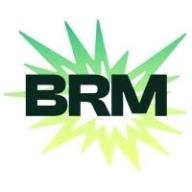

Broadcom Control Compliance Suite and BRM compete in compliance management and resource management respectively. Broadcom Control Compliance Suite is advantageous with its compliance features, while BRM is superior in resource management capabilities.
Features: Broadcom Control Compliance Suite includes comprehensive compliance management, automation features for regulatory audits, and strong compliance robustness. BRM offers robust resource management tools, advanced analytics for project tracking, and effective resource allocation features.
Ease of Deployment and Customer Service: Broadcom Control Compliance Suite provides swift deployment assistance and effective post-deployment support for smooth integration. BRM offers simpler deployment with responsive customer service, enhancing ease of integration.
Pricing and ROI: Broadcom Control Compliance Suite requires a higher initial investment but offers substantial ROI through compliance effectiveness. BRM has a cost-effective setup with significant ROI due to enhanced resource utilization, providing a budget-friendly option.
BRM is designed to streamline business resource management by offering a seamless integration of processes and data within organizations, enhancing communication and efficiency.
BRM serves as a comprehensive tool for organizations aiming to optimize their business processes. It offers valuable features that cater to needs such as data management, resource allocation, and process automation. Implementing BRM can lead to improved operational efficiency, better resource tracking, and enhanced decision-making capabilities. While powerful, BRM provides room for improvement in its integration capabilities with third-party systems, offering potential for expanded functionality.
What are the key features of BRM?BRM implementation varies across industries like manufacturing, healthcare, and finance, adapting to the specific process needs. In manufacturing, it helps in effective resource planning and inventory control, while in healthcare, it improves patient data management and service delivery. In finance, BRM aids in financial data analysis and reporting, boosting efficient financial planning.
Symantec Control Compliance Suite (CCS) delivers the core assessment technologies to enable security and compliance programs, as well as support IT operations in the data center. Control Compliance Suite delivers asset autodiscovery, automates security assessments across procedural, technical, and third-party controls, and calculates and aggregates risk scores according to business-defined threshholds. Customers use this information for operational- and mandate-based reporting, as well as to prioritize remediation and risk reduction in the data center.
Each of the five Control Compliance Suite Modules is available independently or as part of a broader suite. The Control Compliance Suite Control Studio and Infrastructure combines evidence from the multiple modules as well as third party systems; and maps assets and evidence to control statements, standards, and policies and regulations to enable mandate- based and operational reporting. Role-based, customizable Web-based dashboards and reports enable the organization to measure risk and track the performance of its security and compliance programs. Workflow integration with ticketing systems and Symantec server hardening solutions automates remediation and facilitates the hardening of the data center infrastructure.
We monitor all Compliance Management reviews to prevent fraudulent reviews and keep review quality high. We do not post reviews by company employees or direct competitors. We validate each review for authenticity via cross-reference with LinkedIn, and personal follow-up with the reviewer when necessary.